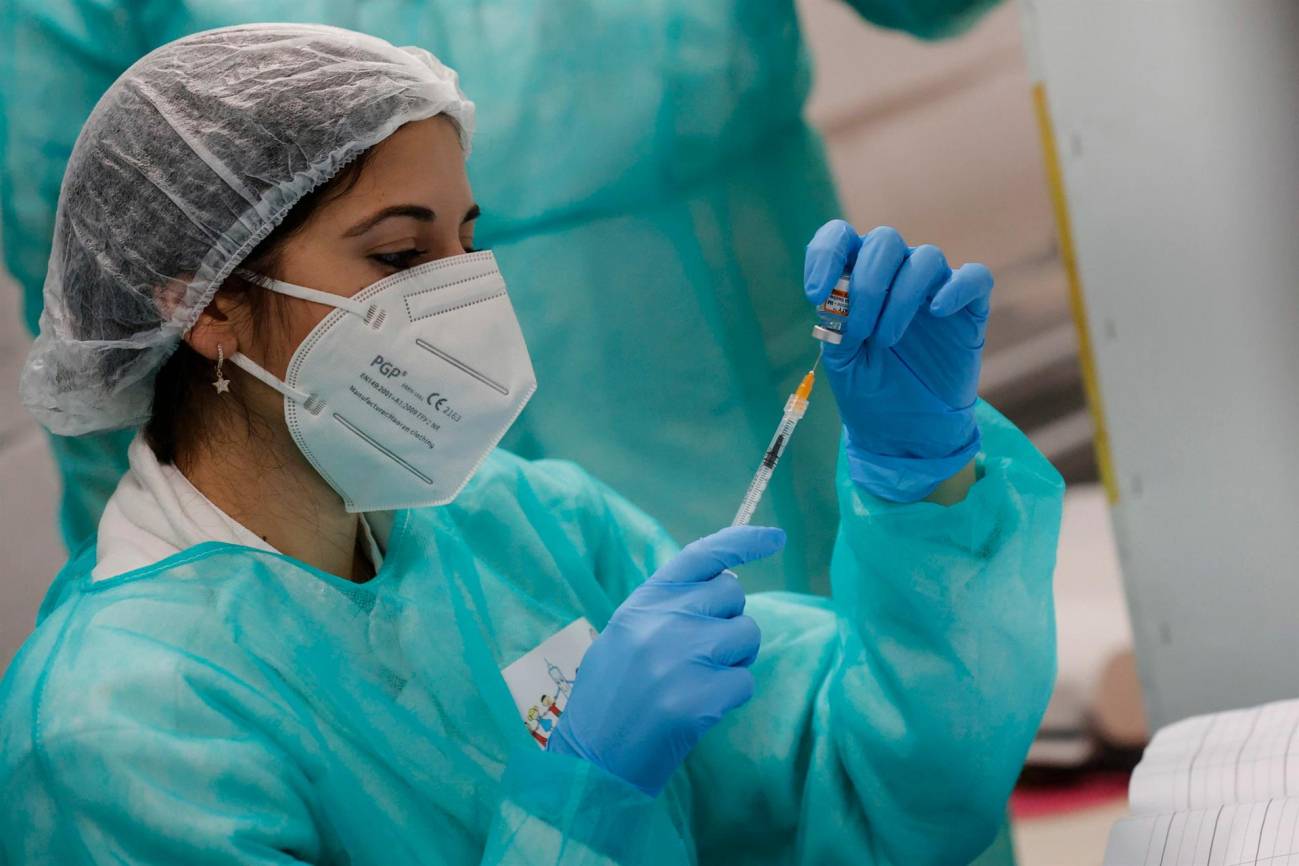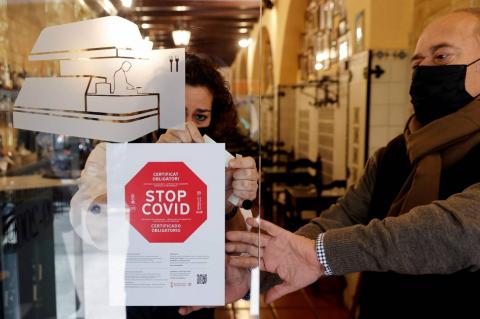Reaction to early laboratory data on how antibodies respond to the omicron variant
In the last few days, data, preprints, press releases and even graphs have started to arrive via social media showing how neutralising antibodies against the omicron variant behave. These studies are preliminary and we will have to wait and see how these lab data translate into the real world.

How do neutralising antibodies behave against the Omicron variant. / EFE | EPA | Giuseppe Lami.
Vicente Mas - anticuerpos ómicron EN
Vicente Mas
Researcher in the Viral Biology laboratory of the Carlos III Health Institute
Preliminary data published to date suggest a greater antigenic impact of the omicron variant compared to other variants of concern that have been selected as a result of the evolution of the virus (beta, delta).
There is some discrepancy, to some extent understandable, as to the magnitude of this antigenic impact.
This may be due to the different vaccination schedules tested, but also to the methodology used in the different studies. Both natural isolates and pseudovirus systems have been used which, although previous studies to date have shown similar trends, do not always reflect the same degree of neutralisation.
In addition, neutralisations are performed in different cell lines, some of them specifically modified to increase their susceptibility to SARS-CoV-2 infection. These cell lines generally overexpress the ACE2 cellular receptor and this can lead to a bias in the degree of neutralisation that is appreciable between variants whose receptor binding regions (RBD) show very different properties.
Given the high number of mutations detected in the omicron RBD, it is expected that its ACE2 binding properties are substantially modified compared to other variants.
It is important to note that these studies only refer to the impact of omicron on the antibody response induced after infection or vaccination. Based on the analysis of the omicron sequence, the T-cell response should not be so severely compromised. Therefore, it is expected that the vaccines administered will maintain a significant level of efficacy in preventing serious infections, not so much in reducing the level of infections and reinfections.
Inmaculada Casas - anticuerpos ómicron EN
Inmaculada Casas
Head of the Respiratory Virus and Influenza Research Group of the Carlos III Health Institute
In recent days, a number of studies have been published that attempt to measure the efficacy of covid-19 vaccines against the omicron variant. The number of these studies is very limited and, above all, the number of patients studied is very limited. This can be considered their first weakness.
What can be measured at the moment is the capacity of the antibodies generated by the vaccines, by the booster dose given to individuals who have been infected and by the third dose given to vulnerable people. A priori, each of the mutations in the spicule protein has a possible action that has an impact on the ability to infect, and not only on the binding of neutralising antibodies. The process is much more complicated because the whole set of these mutations and their possible interactions, hitherto unknown, must be taken into account.
The studies that are currently appearing measure whether or not the antibody titre decreases against the new variant, but the effectiveness of the vaccine cannot be assessed on this basis alone. The system for measuring these variations in antibody titres is not linear. A 40-fold difference, for example, does not mean that there is a 40-fold reduction compared to other variants.
Finally, the use of different technologies can vary the results. The value of neutralising antibody titres generated against the infectious omicron virus is not the same as those generated against a pseudovirus.
We cannot evaluate in the same way the values shown in the different articles that are appearing because the numbers can mean very different concepts, biological activity, viral escape, etc. Obviously it is also not possible to evaluate the effectiveness of vaccines and draw conclusions about how well, or how poorly, they will work in real conditions.
Translated with www.DeepL.com/Translator (free version)
Marcos López Hoyos - anticuerpos ómicron EN
Marcos López Hoyos
Scientific Director of the Valdecilla Health Research Institute (IDIVAL), Head of the Immunology Department, and Professor of Immunology at the University of Cantabria-Marqués de Valdecilla University Hospital
These are the first data that have just come out, not peer-reviewed, but published. This is not the case with the Pfizer note, of which I have only seen one figure pointing to the need for a third dose to combat the omicron variant.
All the data point to a lower neutralising capacity of the antibodies generated both by infection with the Wuhan ancestral variant and by the different types of vaccines tested. Not all situations are tested in all parallel studies, but all of them show a lower neutralising capacity against omicron from 5 to 40% depending on the case.
This would imply a higher infectivity of the variant even in vaccinated and previously infected individuals. Even in the vaccinated infected (hybrid immunity), protection also drops somewhat, although less than in the vaccinated or infected alone.
Manel Juan - anticuerpos ómicron EN
Manel Juan
Head of the Immunology Service
The definitive answer will come from the comparison of the evolution of the infection in vaccinated and unvaccinated individuals. As the T-cell response will be at least partially conserved, I think we already know that the vaccines maintain responses against the variant and will probably be sufficient to maintain their objective of preventing severe disease and significantly reducing hospitalisation.
It is to be expected that the omicron variant will have a spectrum of protection similar to the other variants, since this protection is not so much quantitative (it may be less in number of lymphocytes) but qualitative (effect or non-effect) that can be explained by the immunological memory that will exist.
José Gómez Rial - anticuerpos ómicron EN
José Gómez Rial
Head of the Immunology Department at the Complejo Hospitalario Universitario de Santiago de Compostela (CHUS), Servicio Gallego de Salud (SERGAS)
The in vitro trials that are underway are only trying to verify the loss of neutralising capacity of the antibodies generated by the vaccine due to mutations in the neutralising epitopes of the virus spicule, but the loss of neutralising capacity (partial, very unlikely to be total) does not indicate that the vaccine has lost effectiveness, because the cellular immunity generated is much broader and covers many more epitopes of the protein, so the cellular memory will almost certainly remain conserved against the omicron variant.
The only thing that will probably be observed is a greater contagiousness (transmissibility) as our immune system will not be able to neutralise the virus so quickly in the respiratory mucosa after vaccination. But this need not be alarming as long as there is no loss of effectiveness in the first objective of vaccination, which is to prevent serious disease. The partial loss of neutralising capacity of the antibodies generated by the vaccine, in itself, I do not believe is a reason to reformulate the original vaccine given the time and cost involved. It is much more important to vaccinate the unvaccinated.
In vitro cellular immunity results will take a few weeks longer because they are much more complex to perform. In any case, we must always wait for real-world behavioural data, monitor the evolution of the new variant, the course of disease in vaccinated and unvaccinated individuals and be very attentive to possible vaccine failures in fully vaccinated and immunocompetent individuals.
A partial loss of neutralising capacity of the antibodies generated by the vaccine is to be expected, but cell-mediated immunity to the vast majority of the epitopes of the spicule protein will be preserved. This will imply a greater capacity for contagion or even reinfection, which would be mild and would not imply a loss of vaccine effectiveness.
For the time being, it is unlikely that we are facing a scenario in which omicron is a true escape variant that would require reformulation of the initial vaccine and revaccination of the entire population, something that would take quite some time.



